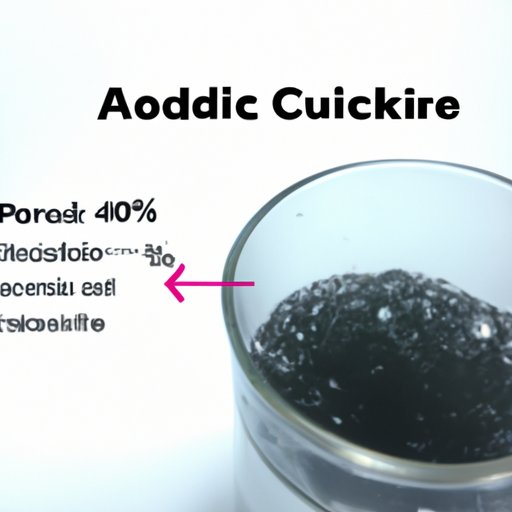Introduction
Coke is a beloved beverage all around the world. It’s carbonated, sweet, and refreshing. But have you ever wondered why Coke is acidic? Understanding the acidity of Coke is important for your overall health as well as for the environment. In this article, we’ll dive into the science of why Coke is acidic, how it affects your body, and what you can do to make better beverage choices.
Understanding Acidity and the pH Scale
Acidity is a measure of how many hydrogen ions are present in a solution. The more hydrogen ions, the more acidic the solution. The opposite is true for alkalinity. Acidity is important to understand because it can affect the properties and behavior of a substance. In order to measure acidity, we use the pH scale, which ranges from 0 to 14.
Water has a neutral pH of 7, while values less than 7 reflect increasing acidity, and values greater than 7 reflect increasing alkalinity. For example, lemon juice has a pH of 2 and is highly acidic, while baking soda has a pH of 9 and is highly alkaline.
Coke, on the other hand, has a pH of approximately 2.5-3.5, which means it falls well into the acidic range of the pH scale.
The Composition of Coke and Its Acidity
So what exactly is Coke made of? According to the nutritional information provided by Coca-Cola, one 12oz can of Coke contains 39 grams of sugar, 34mg of caffeine, and a variety of other ingredients like caramel color and natural flavors. However, the main contributors to Coke’s acidity are carbonic acid and phosphoric acid, which are added for taste and preservation.
Carbonic acid is formed from carbon dioxide gas that dissolves in water, creating a weak acid. Phosphoric acid, on the other hand, is added to cola drinks to give them a tangy flavor and to prevent bacterial growth.
While both carbonic and phosphoric acid have a relatively low pH on their own, it’s the combination of the two that bring Coke’s pH level down into the acidic range.
The Chemistry of Coke and Its Acidity
When a person ingests a can of Coke, the acidic components begin to interact with the saliva and digestive juices in their mouth and stomach. These acids can erode tooth enamel over time, leading to cavities and other dental issues. In fact, a study published in the Journal of the American Dental Association found that consuming sugary and acidic drinks like Coke contributes to dental erosion.
As the acids continue through the digestive system, they can also lead to gastrointestinal issues like acid reflux and heartburn. Scientists have confirmed that the presence of low pH fluids like Coke in the esophagus can cause pain and discomfort in people who suffer from acid reflux disease.
But the acidity of Coke can also have broader implications for the body’s pH balance. When someone consumes a highly acidic beverage like Coke, the body’s natural acid-base balance can be disrupted. This can lead to a buildup of acid in the body, which can cause fatigue, muscle weakness, and other health issues.
Health Effects of Drinking Coke
Aside from the specific health effects we’ve already mentioned, consuming highly acidic beverages like Coke has been linked to a variety of other health problems. For example, a study published in the American Journal of Clinical Nutrition showed a connection between the consumption of acid-forming foods and an increased risk of developing type 2 diabetes.
Another study published in the Journal of Clinical Endocrinology and Metabolism linked acidic beverages with increased bone loss in women, potentially leading to osteoporosis and other bone-related issues. And a third study by researchers at Harvard University found that men who drank two or more sodas a day had a 26% higher risk of developing gout, a painful joint condition, than those who only drank one soda per month.
The Broader Implications of Acidic Beverages
While Coke may seem like just one beverage, its acidity can have a significant impact on the environment as well. In fact, the acids present in Coke can be used for industrial purposes like cleaning rust or dissolving bones. However, improper disposal of these acids can lead to harmful runoff and other environmental consequences.
Additionally, highly acidic foods and drinks like Coke can throw off the body’s natural pH balance, which can lead to other health problems. Experts recommend consuming fresh fruits and vegetables, which tend to be more alkaline than acidic, in order to maintain a healthy acid-base balance in the body.
Coke’s Environmental Impact
As we mentioned earlier, the acids present in Coke can be used for industrial cleaning purposes. However, the disposal of these acids can have negative environmental consequences. In particular, harmful runoff from acidic waste can enter nearby waterways and harm marine life, as well as contaminate sources of drinking water for humans.
The production and transportation of Coke also contributes to larger environmental issues like climate change and pollution. This is why many advocacy groups have pushed for companies like Coca-Cola to reduce their environmental impact through sustainable practices and waste reduction efforts.
Conclusion
Ultimately, understanding the acidity of Coke is important for your health as well as the health of the environment. While Coke may be a refreshing treat every once in a while, it’s important to remember that consuming too much of it can have negative health effects.
If you’re looking for a less acidic alternative, try drinking more water or unsweetened tea. Consuming more fresh fruits and vegetables can also help to maintain a healthy acid-base balance in the body.
By making informed choices about what we consume, we can not only improve our own health but also contribute to a healthier planet.
